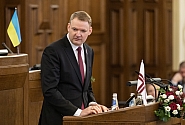
“How fast and how smart Latvia will grow depends on our courage and our work—every day, as we make big and small decisions in our families, in our businesses, in our municipalities, and in our country. Based on the simple but firm belief that Latvia is who we are”, stressed Edvards Smiltēns, Speaker of the Saeima, on Friday, 18 November 2022, at the ceremonial sitting of the Saeima in honour of the 104th anniversary of the Proclamation of the Republic of Latvia.
The Speaker of the Saeima stated that the last year saw unusually dynamic and emotionally saturated history. “The world of November 2022 is not the same as it was a year ago”, noted Smiltēns, referring to Russia’s aggression against Ukraine. He added that the acceleration of history has awakened us and, in a relatively short period, made us do the work that has been postponed for a long time, such as removing occupation-glorifying monuments and transitioning to Latvian as the only language of instruction in schools.
Pointing out that we have become more courageous, Speaker Smiltēns emphasised: “We must recognise that, first and foremost, our security depends on our own courage—the courage to see the truth, to recognise our true enemies and friends, and the courage to act.” The Speaker of the Saeima underlined that it is not just about the determination to take up arms if needed, as in these times entrepreneurs need courage to maintain and develop their businesses, teachers and medics need it to continue their demanding work, and new families need it to make the decision to bring a baby into this world. Smiltēns also stressed that we “need public administration and government that create a sense of security through practical, rational, and thoughtful actions, that support and encourage. They should not play a game of departmental hot potato, but together, unitedly and effectively solve issues that affect all of us”.
“We have taken the first big step away from what we refer to as the USSR heritage and the influence of our imperialist neighbour. It is a step towards self-confidence, self-respect, and the future. Freedom and courage are the soil for new sprouts of democracy, innovations, economy, and public involvement,” acknowledged the Speaker of the Saeima.
Smiltēns stated that foreign policy affects everyone, because everyone is affected by the prices and availability of resources, by refugee flows and the economic problems stemming from the international situation. “It would be very good if the Latvian society understood even more clearly that we cannot be a ‘lonely island’ that remains somewhere on the ‘sidelines’ of global developments,” said the Speaker of the Saeima, while noting—the events of the last year prove that it is completely unnecessary to suffer from inferiority complexes when comparing us to other countries. “The many and varied forms of assistance—which is plentiful for a country of our size—that we have provided and will continue to provide to Ukraine will remain in the memory of the Ukrainian people, and we will be remembered as a reliable friend in this respect, perhaps even more often than some larger and wealthier countries,” said Smiltēns.
The Speaker stressed that foreign policy is not just the responsibility of diplomats. “If we want Latvia’s national interests to be meaningfully represented and defended in the world, then Members of the Saeima must also be active in the pursuit of this goal,” noted Smiltēns, adding that, in a country as relatively small as Latvia, we are all diplomats.
Edvards Smiltēns pointed out that there is no such thing as an abstract ‘state’—there are citizens, there are businesses built by those citizens, there are governance structures elected and built by those citizens, including the Saeima. “It is hard for me to imagine how people can say that they respect their country if they do not respect their fellow citizens or treat the institutions of their country with contempt. Respect does not mean not criticising or not suggesting improvements. Respect means assisting, participating in improvement. Respect means appreciating things that have developed over time in your country, in your community, that are valuable and relevant,” stated Speaker Smiltēns on the 104th anniversary of our country.
Saeima Press Service







